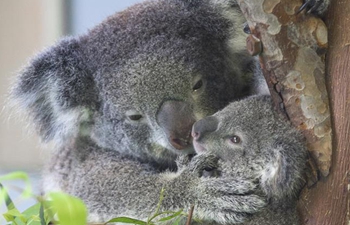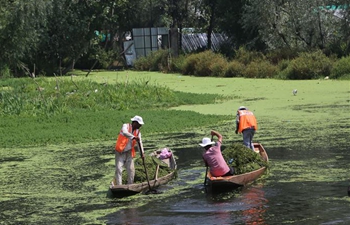by Burak Akinci
DUDEN LAKE, Turkey, Aug. 21 (Xinhua) -- In Turkey's Duden Lake, flocks of gregarious pink flamingos live and feed together peacefully, which has been a major attraction for bird lovers and tourists.
But the colony faces the threat of wetland shrinking, as in the neighboring lakes of the spectacular ecosystem, the water levels have receded in the past years due to excessive human consumption of water.
Located some 100 km south of the Turkish capital Ankara, the brackish lake is surrounded by wheat fields and steppe, some of which are used for cattle grazing.
The site has been declared a protected area, much to the enjoyment of bird watchers from Ankara.
The lake is part of the neighboring lakes and is attached ecologically to the Salt Lake, one of the largest hypersaline lakes in the world and Turkey's second largest lake in terms of area. It provides sanctuary for thousands of flamingos and other bird species, some of which are endangered.
Recent media reports said that the Salt Lake has been classified as a "zone that has suffered serious and irreparable damages in the last 10 years or irreversibly lost small but significant parts," and it needs immediate intervention to take protective measures.
"Salt Lake is shrinking because of climate change but also because of excessive agricultural practices. This is a big threat for the flamingo colonies," said Melih Ozbek, an engineer by profession and a bird lover with an expertise in the field.
Ozbek explained that Turkey harbors several sites of breeding, nesting and feeding for flamingos. One of the two prominent lands is located in Izmir, western Turkey, and the other is Salt Lake, which is a special environmental protection area as designated by the UN Educational, Scientific and Cultural Organization (UNESCO).
Local residents in Salt Lake have dug some 110,000 wells there for mainly irrigation purposes, said Ozbek.
Thus, the lake, which provides a perfect habitat and hatching ground for flamingos which usually choose to lay their eggs in salty and wet areas, is rapidly shrinking, Ozbek added.
The expert also emphasized that, though flamingos are not an endangered species, yet shrinking habitat could make the birds a rarer sight in the future.
For locals, Salt Lake is an important source of cash, as it produces more than 50 percent of all salt produced in Turkey every year.
The receding water level in Duden and neighboring lakes is the biggest threat to the fauna living there due to excessive consumption of ground and surface water despite snow and rainfall.
Fortunately, local authorities have taken drastic infrastructure measures since eight years ago to revive the lake, though failing to return to the former levels.
Flamingos arrive in Turkey from Africa in May and leave again toward warmer parts of the African continent in August, feeding on tiny shrimp-like marine planktons that live in salty waters.
Social media is also an excellent tool for initiating campaigns for the protection of wildlife species, said Ozlem Karacasu, an agricultural engineer and bird photographer.
A court in western Turkey decided this week after a nationwide campaign to save the Gediz Delta, the home for 10 percent of the world's greater flamingos, from a major highway planned to pass through the critical habitat and unique wetland.













